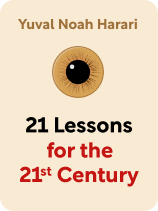

This article is an excerpt from the Shortform book guide to "21 Lessons for the 21st Century" by Yuval Noah Harari. Shortform has the world's best summaries and analyses of books you should be reading.
Like this article? Sign up for a free trial here .
What is the book 21 Lessons for the 21st Century about? What are the biggest problems of the 21st century, according to its author Yuval Noah Harari?
In his book 21 Lessons for the 21st Century, Yuval Noah Harari highlights the three most urgent challenges of the 21st century: 1) the nuclear challenge, 2) the ecological challenge, and 3) the technological challenge. He also shares some thoughts on how to approach these issues, but his main aim is to spur the reader to keep exploring and to participate in shaping the future.
Keep reading for more about the book 21 Lessons for the 21st Century by Yuval Noah Harari.
Premise of the 21 Lessons for the 21st Century Book
The 21st century will bring changes and challenges unlike any humans have encountered before. In his book 21 Lessons for the 21st Century, Yuval Harari highlights the biggest challenges in the modern world and offers advice on making sense of and navigating such transitional times. Each of the 21 chapters covers a lesson about the challenges humans face and how to address them. In five parts, the book:
- Takes stock of the current political and technological state
- Examines potential methods for societies to deal with modern challenges
- Discusses how humans can prevail over these challenges
- Questions how to make sense of the emerging world
- Explores how to find personal meaning in this world
In a Q&A, the author shares some final thoughts about how to approach the 21st century’s biggest challenges. The key takeaways include:
- Of all the stories that humans use to make sense of the world, the two most dangerous are nostalgic fantasies and technological utopias. Nostalgic fantasies misrepresent the past, and they wrongly imply that the past offers solutions to modern problems. Technological utopias suggest that simply creating new technologies will solve big problems, when the more important question is how to use the technologies.
- Believing in the myth of free will makes you vulnerable to manipulation, because you don’t question the internal and external forces that influence your thoughts and feelings. As we discussed in Chapter 20, discarding the notion of free will enables you to explore the forces that influence you and to discover what truly defines you.
- If you want to explore your own mind, try art, therapy, or meditation, as we discussed in Chapter 21. Don’t rely on intellectual research and speculation, because a purely intellectual approach will never help you get to know your mind.
- Humans have a basic desire to be understood. In your human relationships, there are many instances when you fail to understand the other person and she fails to understand you. By contrast, as algorithms increasingly get to know your habits and preferences, they’ll understand you better and better. Eventually, you may come home after a bad day and your spouse won’t notice—but your refrigerator will not only acknowledge your bad mood but also offer you comfort food. Over time, people could become less tolerant of human relationships.

———End of Preview———
Like what you just read? Read the rest of the world's best book summary and analysis of Yuval Noah Harari's "21 Lessons for the 21st Century" at Shortform .
Here's what you'll find in our full 21 Lessons for the 21st Century summary :
- What the unique challenges of the 21st century are and will be
- Why religion can't solve these 21st-century challenges
- How algorithms like Netflix recommendations are teaching you not to trust yourself






